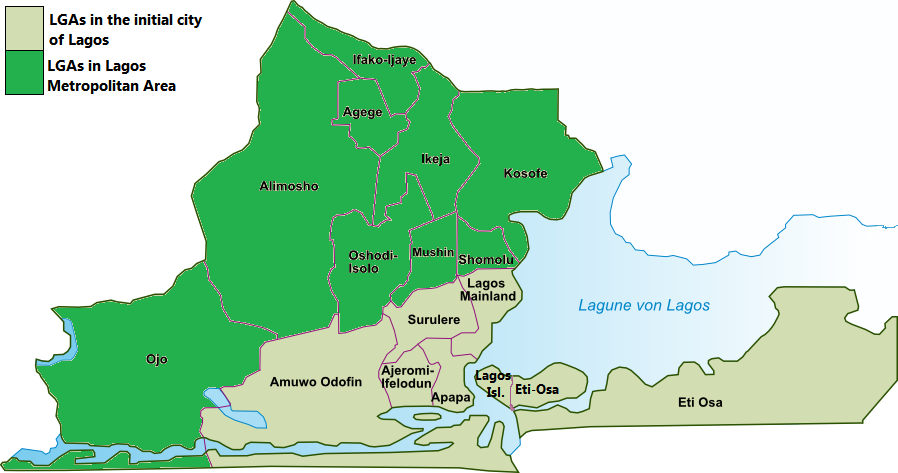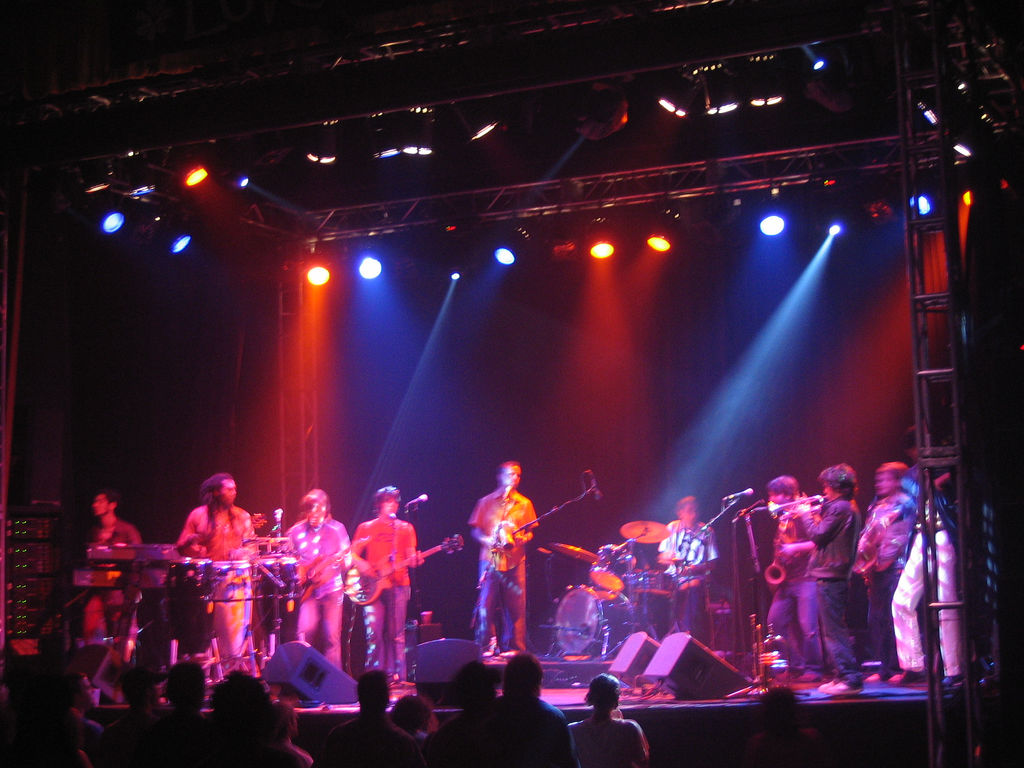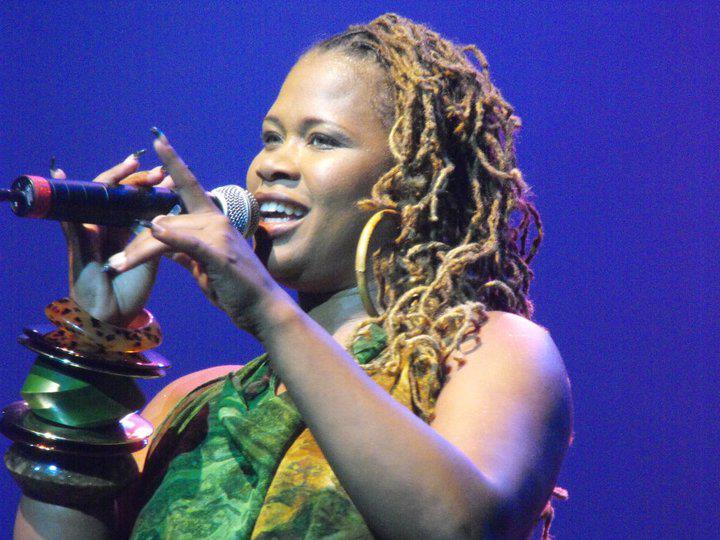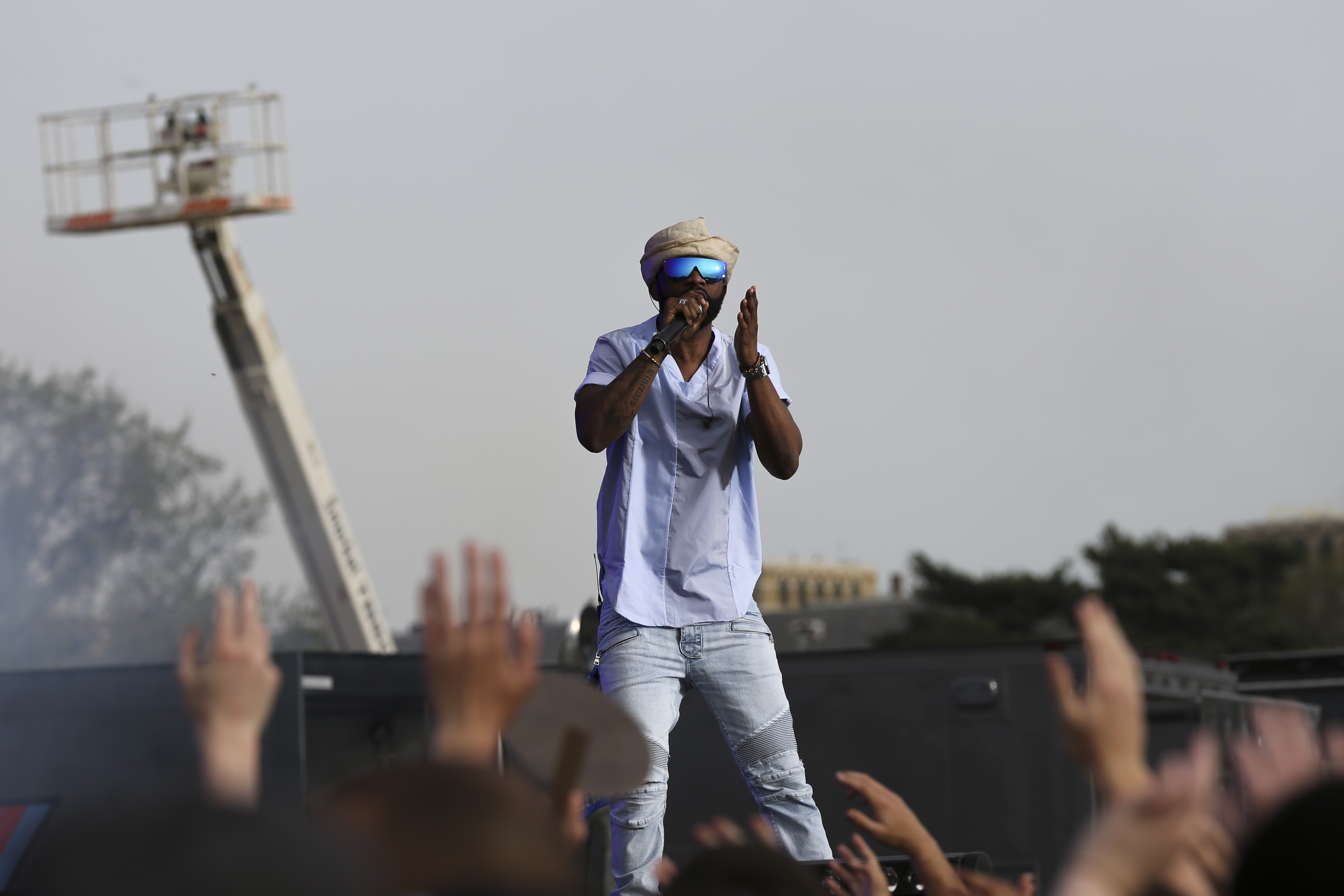|
Afrobeat Musicians
Afrobeat (also known as Afrofunk) is a West African music genre, fusing influences from Nigerian (such as Yoruba) and Ghanaian (such as highlife) music, with American funk, jazz, and soul influences. With a focus on chanted vocals, complex intersecting rhythms, and percussion,Grass, Randall F. "Fela AnikulaThe Art of an Afrobeat Rebel". ''The Drama Review''. MIT Press. 30: 131–148. the style was pioneered in the 1960s by Nigerian multi-instrumentalist and bandleader Fela Kuti, who popularised it both within and outside Nigeria. At the height of his popularity, he was referred to as one of Africa's most "challenging and charismatic music performers." Distinct from Afrobeat is Afrobeats, a combination of sounds originating in West Africa in the 21st century. This takes on diverse influences and is an eclectic combination of genres such as hip hop, house, jùjú, ndombolo, R&B, soca, and dancehall. The two genres, though often conflated, are not the same. History Afrobea ... [...More Info...] [...Related Items...] OR: [Wikipedia] [Google] [Baidu] |
West African Music
The music of West Africa has a significant history, and its varied sounds reflect the wide range of influences from the area's regions and historical periods. Traditional West African music varies due to the regional separation of West Africa, yet it can be distinguished by two distinct categories: Islamic music and indigenous secular music. The widespread influence of Islam on culture in West Africa dates back to at least the 9th century, facilitated by the introduction of camels to trade routes between the North Africa, North of Africa and West Africa. Islam-influenced West African music commonly includes the use of stringed instruments like the ''goje,'' while more secular traditional West African music incorporates greater use of drums such as the ''djembe.'' Contemporary styles of music in West Africa have been influenced by Music of the United States, American music, South African jazz, African jazz and gospel music. The forced migration of Africans to the Americas as a res ... [...More Info...] [...Related Items...] OR: [Wikipedia] [Google] [Baidu] |
Fela Kuti
Fela Aníkúlápó Kútì (born Olufela Olusegun Oludotun Ransome-Kuti; 15 October 1938 – 2 August 1997) was a Nigerians, Nigerian musician and political activist. He is regarded as the principal innovator of Afrobeat, a Nigerian music genre that combines West African music with American funk and jazz. At the height of his popularity, he was referred to as one of Africa's most "challenging and charismatic music performers". AllMusic described him as "a musical and sociopolitical voice" of international significance. Kuti was the son of Nigerian women's rights activist Funmilayo Ransome-Kuti. After early experiences abroad, he and his band Africa '70 (featuring drummer and musical director Tony Allen (musician), Tony Allen) shot to stardom in Nigeria during the 1970s, during which he was an outspoken critic and target of Nigerian military juntas of 1966–1979 and 1983–1999, Nigeria's military juntas. In 1970, he founded the Kalakuta Republic commune, which declared itsel ... [...More Info...] [...Related Items...] OR: [Wikipedia] [Google] [Baidu] |
Lagos
Lagos ( ; ), or Lagos City, is a large metropolitan city in southwestern Nigeria. With an upper population estimated above 21 million dwellers, it is the largest city in Nigeria, the most populous urban area on the African continent, and one of the fastest-growing megacity, megacities in the world. Lagos was the national capital of Nigeria until the Government of Nigeria, government's December 1991 decision to move their capital to Abuja, in the centre of the country. Lagos is a major African financial center, financial centre and is the economic hub of Lagos State and Nigeria at large. The city has a significant influence on commerce, entertainment, technology, education, politics, tourism, art, and fashion in Africa. Lagos is also among the top ten of the world's fastest-growing cities and Urban area, urban areas. In 2024, Time Out (magazine), Time Out magazine ranked Lagos as the 19th best city to visit in the world. A megacity, it has the second-highest Gross domestic pr ... [...More Info...] [...Related Items...] OR: [Wikipedia] [Google] [Baidu] |
Fuji Music
Fújì is a genre of Yoruba popular music that emerged in Nigeria in the 1960s. It evolved from the improvisational wéré music also known as ajísari (meaning "waking up for sari", performed to awaken Muslims before dawn during the fasting season of Ramadan. Fuji music was named after the Japanese stratovolcano-mountain, Mount Fuji by Alhaji Sikiru Ayinde Barrister (pioneer of wéré). It features energetic beats, diverse Yoruba rhythms, and call-and-response vocals. Fuji's influence extends into contemporary music, with its hooks and rhythms frequently appearing in Nigerian hip hop. In February 2024, professor and filmmaker Saheed Aderinto released the first episode of The Fuji Documentary titled "Mr. Fuji: Barry Wonder" which chronicles the story of Fuji music creator Sikiru Ayinde Barrister. Etymology Sikiru Ololade Ayinde Balogun Barrister significantly popularized wéré music during the 1950s and 1960s and later coined the term "fuji" for his new innovation ( ... [...More Info...] [...Related Items...] OR: [Wikipedia] [Google] [Baidu] |
Tony Allen (musician)
Tony Oladipo Allen (20 July 1940 – 30 April 2020) was a Nigerian/Ghanaian drummer, composer, and songwriter who lived and worked in Paris, France. Allen was the drummer and musical director of Fela Kuti's band Africa '70 from 1968 to 1979, and was one of the founders of the Afrobeat genre. Fela once stated that "without Tony Allen, there would be no Afrobeat". He was described by Brian Eno as "perhaps the greatest drummer who has ever lived". Later in life, Allen collaborated with Damon Albarn on several projects, including Gorillaz, the The Good, the Bad & the Queen, Good, the Bad & the Queen and Rocket Juice & the Moon. Early career Allen was born in Lagos, Nigeria to James Alabi Allen, a motor mechanic from Colonial Nigeria, British Nigeria (now present day Nigeria) and Prudentia Mettle, from the Gold Coast (British colony), Gold Coast (now present day Ghana). He began playing drums at the age of 18, while working as an engineer for a radio station. Allen was influenced ... [...More Info...] [...Related Items...] OR: [Wikipedia] [Google] [Baidu] |
Fela Kuti (cropped)
Fela Aníkúlápó Kútì (born Olufela Olusegun Oludotun Ransome-Kuti; 15 October 1938 – 2 August 1997) was a Nigerian musician and political activist. He is regarded as the principal innovator of Afrobeat, a Nigerian music genre that combines West African music with American funk and jazz. At the height of his popularity, he was referred to as one of Africa's most "challenging and charismatic music performers". AllMusic described him as "a musical and sociopolitical voice" of international significance. Kuti was the son of Nigerian women's rights activist Funmilayo Ransome-Kuti. After early experiences abroad, he and his band Africa '70 (featuring drummer and musical director Tony Allen) shot to stardom in Nigeria during the 1970s, during which he was an outspoken critic and target of Nigeria's military juntas. In 1970, he founded the Kalakuta Republic commune, which declared itself independent from military rule. The commune was destroyed in a 1978 army raid that inj ... [...More Info...] [...Related Items...] OR: [Wikipedia] [Google] [Baidu] |
Sean Kuti & Egypt 80 At NH7 Weekender
Sean, also spelled Seán or Séan in Hiberno-English, is a male given name of Irish origin. It comes from the Irish versions of the Biblical Hebrew name ''Yohanan'' (), Seán (anglicized as ''Shaun/Shawn/ Shon'') and Séan (Ulster variant; anglicized ''Shane/Shayne''), rendered ''John'' in English and Johannes/Johann/Johan in other Germanic languages. The Norman French ''Jehan'' (see ''Jean'') is another version. In the Irish language, the presence and placement of the síneadh fada is significant, as it changes the meaning of the name. The word "Sean" in Irish means "old", while the word "Séan" means "omen". For notable people named Sean, refer to List of people named Sean. Origin The name was adopted into the Irish language most likely from ''Jean'', the French variant of the Hebrew name ''Yohanan''. As Irish has no letter (derived from ; English also lacked until the late 17th Century, with ''John'' previously been spelt ''Iohn'') so it is substituted by , as was the nor ... [...More Info...] [...Related Items...] OR: [Wikipedia] [Google] [Baidu] |
The Observer
''The Observer'' is a British newspaper published on Sundays. First published in 1791, it is the world's oldest Sunday newspaper. In 1993 it was acquired by Guardian Media Group Limited, and operated as a sister paper to ''The Guardian'' and '' The Guardian Weekly''. In December 2024, Tortoise Media acquired the paper from the Scott Trust Limited, with the transition taking place on 22 April 2025. History Origins The first issue was published on 4 December 1791 by W.S. Bourne, making ''The Observer'' the world's oldest Sunday newspaper. Believing that the paper would be a means of wealth, Bourne instead soon found himself facing debts of nearly £1,600. Though early editions purported editorial independence, Bourne attempted to cut his losses and sell the title to the government. When this failed, Bourne's brother (a wealthy businessman) made an offer to the government, which also refused to buy the paper but agreed to subsidise it in return for influence over its editori ... [...More Info...] [...Related Items...] OR: [Wikipedia] [Google] [Baidu] |
Dancehall
Dancehall is a genre of Jamaican popular music that originated in the late 1970s. Initially, dancehall was a more sparse version of reggae than the roots reggae, roots style, which had dominated much of the 1970s.Barrow, Steve & Dalton, Peter (2004) "The Rough Guide to Reggae, 3rd edn.", Rough Guides, This music genre wasn't officially named until the 1980s, when the two words ''Dance'' and ''Hall'' (referring to the common venue) were joined to form ''Dancehall'', which was then promoted internationally for the first time. At that time digital instrumentation became more prevalent, changing the sound considerably, with digital dancehall (or "ragga") becoming increasingly characterized by faster rhythms. Key elements of dancehall music include its extensive use of Jamaican Patois rather than Jamaican English, Jamaican standard English and a focus on the track instrumentals (or "riddims"). Dancehall saw initial mainstream success in Jamaica in the 1980s; by the 1990s, it became i ... [...More Info...] [...Related Items...] OR: [Wikipedia] [Google] [Baidu] |
Soca Music
Soca music, or the "soul of calypso", is a genre of music that originated in Trinidad and Tobago in the 1970s. It is considered an offshoot of Calypso music, calypso, with influences from Afro–Trinidadians and Tobagonians, Afro-Trinidadian and Indo–Trinidadians and Tobagonians, Indo-Trinidadian rhythms. It was created by Ras Shorty I (or Lord Shorty) in an effort to revive traditional calypso, the popularity of which had been declining amongst younger generations in Trinidad due to the rise in popularity of reggae from Jamaica and Soul music, soul and funk from the United States. From the 1980s onward, soca has developed into a range of new styles. Etymology "Soca" is a Blend word, portmanteau of the words "soul" and "calypso". The genre was defined by Lord Shorty as the "Soul of Calypso." The word was originally spelled s-o-k-a-h by Lord Shorty. In a 1979 interview with ''Carnival Magazine,'' Lord Shorty stated that he "came up with the name soca. I invented soca. And I ... [...More Info...] [...Related Items...] OR: [Wikipedia] [Google] [Baidu] |
Contemporary R&B
Contemporary R&B (or simply R&B) is a popular music Music genre, genre, originating from African Americans, African-American musicians in the 1980s that combines rhythm and blues with elements of Pop music, pop, Soul music, soul, funk, Hip-hop, hip hop, and electronic music. The genre features a distinctive Record producer, record production style and a smooth, lush style of vocal arrangement. Electronic music, Electronic influences and the use of hip hop or electronic dance music, dance-inspired beat (music), beats are typical, although the roughness and grit inherent in hip hop may be reduced and smoothed out. Contemporary R&B vocalists often use melisma, and since the mid-1980s, R&B rhythms have been combined with elements of hip hop culture and music, pop culture and pop music. Precursors According to Geoffrey Himes speaking in 1989, the progressive soul movement of the early 1970s "expanded the musical and lyrical boundaries of [R&B] in ways that haven't been equaled since" ... [...More Info...] [...Related Items...] OR: [Wikipedia] [Google] [Baidu] |
Ndombolo
Ndombolo, also known as dombolo, is a genre of dance music originating in the Democratic Republic of the Congo. Derived from soukous in the 1990s, with fast-paced hip-swaying dance rhythms, often accompanied by Beat (music), upbeat, Percussion instrument, percussion-driven music, the style became widespread in the mid-1990s and the subsequent decade, dominating dancefloors in Central Africa, central, East Africa, eastern, and West Africa, western Africa. It inspired Afrobeats, West African popular music, coupé-décalé, Kuduro, and Sub-Saharan African music traditions, East African dance music. Ndombolo customarily features lead vocalists, backup vocalists, guitars, drums, and Synthesizer, synthesized sounds. The lyrics often explore themes of human relations, marriage, courtship, trickery, disappointment, and Politics of the Democratic Republic of the Congo, Congolese sociopolitical culture. Prominent musicians such as Papa Wemba, Dany Engobo, Koffi Olomide, Werrason, Awilo Lo ... [...More Info...] [...Related Items...] OR: [Wikipedia] [Google] [Baidu] |







